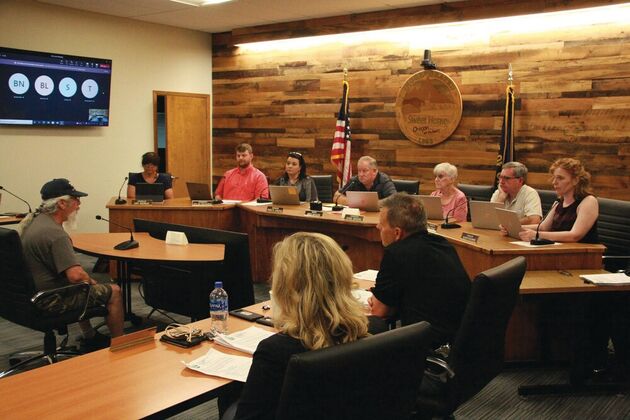By Benny Westcott
Of The New Era/Lebanon Local
A City Council majority said “no” last week to psilocybin in Sweet Home, voting Tuesday, July 26, to adopt a resolution referring to voters a measure proposing a prohibition on businesses related to the psychedelic prodrug compound.
Councilors also adopted a ballot title and explanatory statement, and held first and second readings of an ordinance bill banning psilocybin centers and the manufacture of such products. It would become operative 30 days after approval by a majority of voters in the Nov. 8 general election.
“[T]he Oregon Health Authority has not completed the rulemaking process for implementing the state’s psilocybin regulatory program,” the ordinance reads, “and the city of Sweet Home is uncertain how the manufacture, delivery and administration of psilocybin at licensed psilocybin facilities will operate within the city.”
Councilor Lisa Gourley cast the sole dissenting vote, telling The New Era, “I don’t know enough about the current clinical research being conducted.
“Having a local ballot measure in place could prevent local medical, rehabilitation, and memory care facilities from prescribing a treatment utilizing any derivatives of psilocybin found medically useful in the future, until a second ballot measure designed to repeal this one, if it passes, was sent to the public. We simply need more information regarding the viability of medical research on psilocybin.”
In 2020, Oregon voters approved Measure 109, known as the Oregon Psilocybin Service Act, which allows for the manufacture, delivery and administration of psilocybin at licensed facilities. Ore-gon was the first state to pass such an initiative.
Psilocybin, often referred to as psychedelic mushrooms, is a federally regulated Schedule I drug. Preliminary data from clinical trials suggests that psilocybin therapies are effective for treating depression, anxiety, post-traumatic stress disorder, obsessive compulsive disorders, smoking cessation and alcoholism. Experts caution, however, that such fungi can be very powerful and even deadly.
The city has the option to prohibit psilocybin service centers and manufacturers within the city limits, but any such prohibition must be referred to voters in November.
Measure 109 passed in Oregon with 55% of the vote. However, Linn County voted 55% against it, with Sweet Home at 59% in opposition.
In other action:
♦ The council unanimously approved an application for a grant geared toward making traveling to school via walking or biking safer for Sweet Home School District students.
The application – assembled over the last year by staff, district and community partners – focuses on Mountain View Road to the north and south of Sweet Home Junior High School and includes improvements to that road from Ames Creek Road to Juniper Street, as well as to intersections in between and the intersection of Ames Creek Road and Grape Court/Loop. These areas were found to be the most in need of safety improvements.
A grant is being applied for through the Oregon Department of Transportation Safe Routes to School Competitive Construction Grant program, which funds pedestrian improvements with the goal of improving safety for students walking and biking to school. The program has two tiers of support – one requires a 40% local match; the other, 20%. Under program rules, the project qualifies for a local match of only 20%, making it a “significant financial benefit to the community,” according to a request for council action submitted by Community and Economic Development Director Blair Larsen.
He credited local grant writer Donna Short for working with the city and school district and performing most of the “leg work” on the application.
The total project cost is estimated to be $2,182,800, with the required 20% match from the city amounting to $436,560. Larsen noted in his RCA that the project is expected to start in the next fiscal year.
♦ Resident Vince Adams asked the council and law enforcement to do something about speeding on Mountain View Road, on which he resides.
He cited the Sweet Home Police Department’s recent survey done on speeding in the area.
“I don’t know why we needed to do a survey; we just need to write tickets,” he said. “They put a little reader board up down there, and it worked for a while. But I know for a fact it’s not working now. It was more of a challenge, I think. People want to see how fast they can get that thing going, or how fast they could run the numbers up.”
“It’s ridiculous, and the numbers showed that in the survey,” he continued. “Something needs to be done before somebody has an accident or somebody gets hit. Right now school is not in session, but I know for a fact that even when school is in session, it’s still an issue. I know nothing’s being done on Mountain View, and we’ll throw Elm Street and Long Street in with that. The city council needs to take charge and get it done before somebody gets hurt.”
“That’s probably one of our worst areas in Sweet Home as far as traffic associated with speeding,” Police Chief Jeff Lynn replied. “The reader board that he speaks of is down right now. A battery has been ordered by Public Works. I’m not going to disagree with anything he says. We’ll focus more on that area and try to make a difference.”
Lynn posited that adjustments made by the potential Safe Routes to School grant could curb the problem.
“The hope would be that changing some of the design of that roadway would alter the speeds, but that’s to be seen,” he said.
“The speeding in this town is really unacceptable,” Mayor Greg Mahler said, citing Mountain View as well as Elm, Long and Main streets.
“If I was speeding 45 miles per hour in a 25-mile-per-hour zone,” Councilor Dave Trask added, “I deserve to get a ticket. It’s that simple.”
Trask didn’t think the municipal court should cut down on fines, instead taking full amounts for speeding offenses.
♦ The council voted 5-2 to accept city engineer of record West Yost Associates’ requested amendment to add $10,000 to a Water Master Plan task order, which city staff approved in September 2021 for a price not to exceed $150,990. The project evaluates the current water system’s existing condition and future needs, identifying needed improvements for further development.
During the course of this work, West Yost discovered that an alternate method of forecasting population growth would better suit the city’s needs but would require some additional design at a cost of $10,000, bringing the total project to a budget not to exceed $160,990.
Councilors Angelita Sanchez and Dylan Richards cast the dissenting votes.
Sanchez asked if West Yost could cut back on something before asking for additional money. Public Works Director Greg Springman replied that such discussions have yet to occur.
“For me at least, when I do things like this, I try to negotiate a little bit to see if we can get a little bit better deal on some of the things when there’s a little bit of an overrun, and still get the work done that needs to be done,” Sanchez said.
“I don’t like holding back and not getting it done as soon as possible,” Trask replied. “And I don’t like giving them extra money too, but I think we should move this forward, and you can still ask if they can do something.”
♦ Council voted unanimously to send the city’s top five recommended legislative issues to the League of Oregon Cities (LOC) for 2023. They include economic development incentives, property tax reform, resilient and futureproof broadband infrastructure and planning investments, road user fee/vehicle miles traveled (VMT) structure and funding for recovery of abandoned recreational vehicles.
“This prioritization exercise is one of the early tools used to organize statewide efforts of LOC, and to help give voice to small to mid-size cities that may otherwise not have legislative influence,” Administrative Services Manager Julie Fisher wrote in her RCA.
♦ Council voted unanimously to approve a contract extension with Portland-based Government Portfolio Advisors. The firm provides the city with investment advice, reviews its portfolio and potential transactions, and provides advice on beneficial purchases.
GPA first entered an agreement with the city in 2017. The contract was originally for three years and has been extended twice, in 2020 and 2021, with the latest extension being for another year. The city pays the GPA $5,000 annually in the current agreement.
♦ City Manager Pro Tem Christy Wurster shared a City Council Candidate Handbook, which noted that the filing period to run for seats in the Nov. 8 general election opened at 8 a.m. Monday, Aug. 1, and closes at 4p.m. Friday, Sept. 2. Forms must be returned during that period to the city manager’s office at City Hall, 3225 Main St.
A candidate must be a qualified elector (registered voter) of the city. Under state law, a qualified elector must reside in the city at least one year immediately before the election.
Greg Mahler, Susan Coleman, Diane Gerson and Dylan Richards face expiring council terms.
The City Council Candidate Handbook and relevant associated forms are available online at https://www.sweethomeor.gov/citycouncil/page/city-council-2023-elections.




